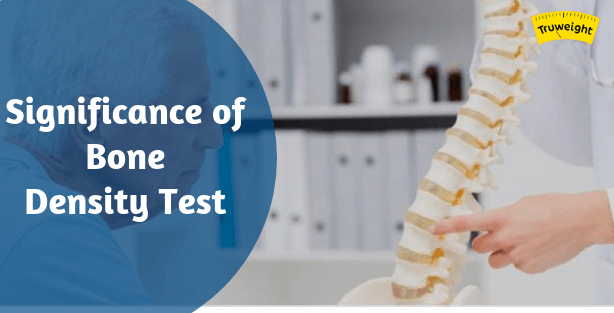Health
What Is Bone Density Test, & Why Should You Get It Done?
A bone density test is done for testing the bone strength. It refers to a DEXA scan and it is quite similar to an X-ray.
The primary purpose for getting this test done is to find out about the serious bone loss condition called osteoporosis and prevention of fractures and associated disability.
Table of Contents
- People for whom bone density test
- Who can get a DEXA or a bone-density scan?
- Ways to keep bones strong
The bone density test is highly recommended for the older adults, especially those with some risk factors such as a bone break, or women with menopause, etc.
A bone density test helps in diagnosing if the person has normal bone density or low bone density such as osteopenia or osteoporosis. A bone density test helps in finding:
- If there are weak bones or osteoporosis before breaking of a bone
- Predicting chances of breaking a bone in the near future
- Diagnosing the state of bone density whether it is improving, or getting worse or is stable.
- Finding out if the medicine for osteoporosis is working
People for whom Bone Density Test
The bone density test is recommended to find what is the average bone density of a human. It is suggested to carry out this test for the following groups:
- Women of or above 65 years
- Men of or above 70 years
- If a bone is broken after 50 years
- Women in menopausal stage
- Postmenopausal woman below 65 years
- Men in the age group of 50-69 with risk factors
A bone density test for measuring bone mass density is necessary in the following situations:
- An X-ray of the spine revealing a break or bone loss in the spine
- Back pain with a probable break in the spine
- Height loss of half an inch or more within the last one year
- Total height loss of one and a half inches from the original height
It is important to note that people under 65 years don’t need a bone density test, due to the following reasons:
- People under 65 don’t have the risk of serious bone loss.
- People under 65 years can have a mild bone loss also known as osteopenia. As the risk of breaking the bone is low, there is no need for a test.
- The best way to prevent the bone loss is regular exercise and sufficient intake of vitamin D and calcium.
The risk associated with the bone-density scan
Bone density tests although give only small radiations to the body, but it can lead to a risk of a rise in radiation exposure.
These effects on the body can remain for entire life. Hence it is better to avoid them.
Who can get a DEXA or a bone-density scan?
The DEXA scan is recommended for women above 65 years and men above 70 years.
However, it is important to talk with the healthcare providers before a decision about the test to know about the associated advantages and disadvantages.
Even the younger men and women between 50-69 years can get the test done if they are at risk of serious bone loss. These risk factors are as follows:
- A broken bone due to a minor accident
- Rheumatoid arthritis.
- Smoking.
- Heavy drinking.
- Low body weight.
- Use of corticosteroid drugs for more than three months.
- Osteoporosis-related disorders.
A follow-up bone-density test is required after some years, based upon the results of the first test.
For bone loss, drug treatment is necessary.
The most common drugs for treating bone loss are Actonel (generic risedronate) and Fosamax (generic alendronate). However, there are risks and benefits of these drugs, hence, should be taken by consultation with the health provider.
The common side effects of these drugs are stomach upset, difficulty in swallowing, and heartburn.
Rare side effects are pain in bones, joints and muscles, bone loss in the jaw, crack in the thighbones, and heart rhythm problems. The other drugs for bone loss also have several risks like blood clots, strokes, heart attacks, and serious infections.
Moreover, some patients are able to get only limited benefits. Several patients with mild bone loss also take these medicines, but evidence show that these are not able to help them much.
Even if the drugs are able to help, it is for few years; hence these are worth considering only in case of serious bone loss. It is better to treat mild bone loss through exercise, calcium and vitamin D.
Ways to keep bones strong
These are some bone density guidelines for making bones stronger:
1. Exercise:
Exercise is the best way to make bones stronger. Hence, it is important to do exercise which will help the bone to carry weight.
On walking, the whole weight of the body is carried by the bones. Weight lifting can be a good exercise. The idea is to do weight-bearing exercises for 30 minutes a day.
2. Getting enough calcium and vitamin D:

Calcium and vitamin D helps in making the bones strong. One should take atleast 1,200 mg of calcium in a day.
To get sufficient calcium one should eat a lot of dairy products, green leafy vegetables, salmon and canned sardines.
For the remaining calcium deficiency gap supplements can be taken every day.
For those people who have little exposure to sun or woman in the menopause stage can take 800 IU of vitamin in a day to increase bone density.
Watch the Video For Can Deficiency of Vitamin B12 be Damaging?
3. Avoid smoking and limit alcohol:
Intake of alcohol and smoking can gear up bone loss. For this purpose, an attempt should be made to adopt a stop-smoking program.
For this purpose, a family doctor can be consulted to get a nicotine patch or any other treatments.
4. Avoiding some drugs:
Some drugs can lead to damage of bones. Such drugs include proton pump inhibitors (for example, omeprazole, pantoprazole and lansoprazole,) which are used for treating heartburn; corticosteroids; and some antidepressants.
In case these drugs are taken regularly, the doctor should be consulted to know about its side effects.
The average bone density scores by age help in revealing the true health of the bones. For maintaining healthy bones one needs to exercise regularly and need calcium-rich food, exposure to the sun is also equally important.
Quitting smoking and giving up alcohol is also recommended. Following these guidelines will definitely help in maintaining good bone health and strong teeth.
FREE CONSULTATION with a Possible Nutritionist
